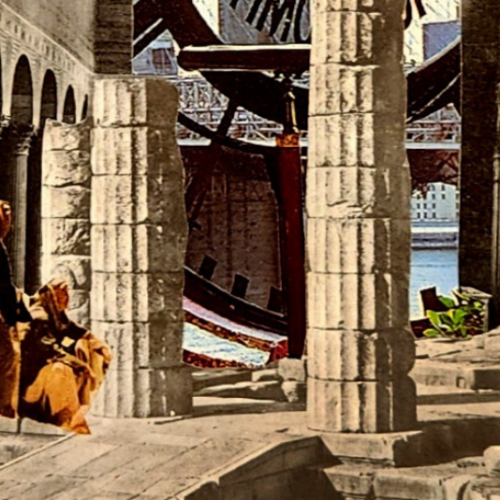Then she asked how long it would take to get there. As if we’d never made the trip before.
“Just a bit longer,” I said, my eyes firmly on the road ahead. She kicked the back of my seat—not an accident, so I ignored it and turned the radio up.
“I’m hungry,” she said. “Can’t we stop and eat something?”
But we couldn’t, and we didn’t. And we should have. And now I’ll never know what difference a truck stop or a drive-thru hamburger could have made. Because then, we were just in the car with the radio playing and the skeleton of a juice box wedged between the armrest and seat.
A peace offering, I blindly rifled through my purse and handed back a cheese stick, which buckled under my touch. She threw it back, hitting the windshield so hard the packaging opened slightly and a greasy film slid unceremoniously to the dashboard.
It’s still there, the iridescent stain within my line of vision, obscuring what I should have seen.
He lived on the other side of Donner Lake, made famous by the cannibalistic horde that trudged and ate their way across the terrain. Out of the corner of my eye, I could see the statue— tall pioneers facing West, their limbs and flesh intact. I sped by before I could check if my memory was correct, if one of them was actually pointing West, a sign inviting me to turn around and bring my daughter home and away from these monthly visits, but I missed it. The sign, I mean.
He loved her, I know. But he had loved me, too. And the distance that I felt from him now was so much larger than the miles I had to drive. Every month it seemed he’d diminished somehow, lessened. The angles of his face turned sharper, harsher. She didn’t seem to notice, still running to him and allowing herself to be scooped up, even though she was almost too big for it. She never turned around after that. He’d wave, more of a dismissal than a courtesy, and I’d drive away, watching her get smaller and smaller with each foot, mile, year.
I should have noticed something. Felt something. A mother’s intuition and all that. But it was ordinary. The weather. The lake. The Donner Party. Nothing then spelled the now I know to be true. Like any other day, she flew into his arms and was lifted. Her left shoe was untied, and I wanted to get out of the car and tie it for her, but I knew he’d see it as a missive. A bird landed on the bench by the front door and cocked its head, as if investigating the reunion for authenticity. I sat, the window rolled down and the heat pressing into the backs of my thighs until he turned, mechanically waving a long arm into the air. Her ponytail had come loose, the ribbon I’d tied that morning drooping toward the base of her neck, barely holding on as the door closed behind them.
Driving back, I craned my neck to see the statue, but couldn’t find it amid the trees and traffic. The parking lot was full; families were taking pictures of themselves, and three women wearing fanny packs and chatting animatedly were hurrying toward the public restroom. I felt a small surge of love for the world in that moment, a rising within me that belied the ritual I’d just completed. I looked in the rearview mirror at the empty booster seat and the dried french fries nestled in its corners and thought about what I had to do once I got home. Pay some bills, let the dog out, tweeze my eyebrows. Now, I blame myself for thinking of the rudimentary, for allowing myself the luxury of taking my mind off of her for one moment.
She’d be nine now, but in my mind’s eye, she is that ponytail, the ribbon. She is loose teeth and ballet slippers and nightlights that keep the dark at bay. Every year, specialists create an age progression image to put on the flyers, but I can’t make myself look at it. When she comes back she will be five again and kicking the back of my seat and the years will disappear like lines on asphalt.
I know he’s out there with her, discovering something new and strange, and I can’t bear to think of what he’s told her. How he’s explaining this away, diminishing me. I keep my eyes open all the time, looking for a shadow that reminds me of hers. I listen for the soft fall of her footsteps against the linoleum of the hospital where I work. I think of the Donner Party, wondering if their hunger was what led them to it, or if they thought, in moments of loss, that consuming their loved ones might keep them safe. Perhaps they believed that by tucking themselves inside their mothers’ bodies once more, they’d be born again in the promised land, not lost to the world with no one to point the way home.

Katie Zeigler
Katie M Zeigler is a writer and professor living in Walnut Creek, CA. Zeigler holds a BA and MA in English from Stanford University and an MFA in Creative Writing from St. Mary's College. She has been published in Smokelong Quarterly, The Worcester Review, Stonecoast Review, Atlas & Alice, The Centifictionist, Digging, and Griffel. Zeigler won the 2023 Baltimore Review Winter Contest, and theStanford Magazine Fiction Contest, was a finalist in Glimmer Train’s short fiction contest, and placed second in Fish Anthology’s international flash fiction contest. She currently teaches writing at St. Mary's College and creative writing at Diablo Valley College. Visit her at katiemzeigler.com.



